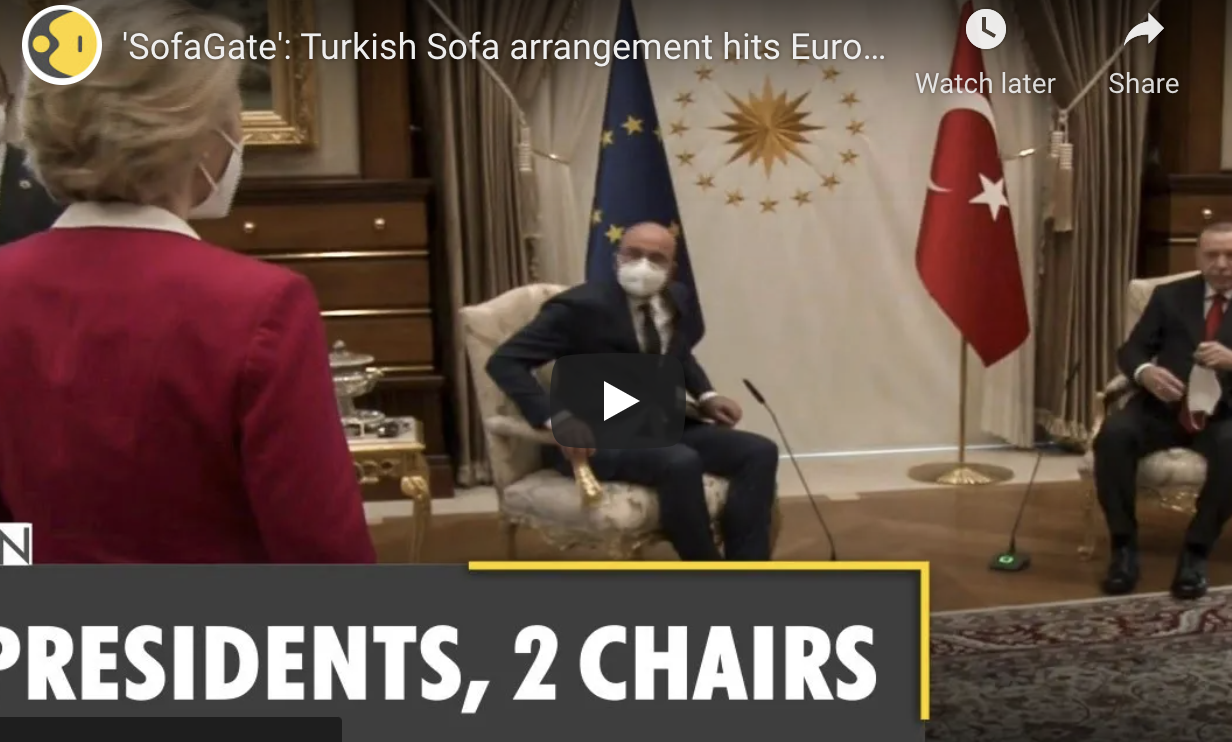By William Gourlay
It’s said that politics makes for strange bedfellows. In diplomacy, it would seem that it’s seating arrangements that can be tricky. At a 6 April meeting of European Commission President Ursula von der Leyen and European Council head Charles Michel with Turkey’sfamously combative President Recep Tayyip Erdogan, von der Leyen was left, for one uncomfortable moment, without a chair.
Footage has emerged of the meeting in Ankara as Erdogan and Michel take up seats while von der Leyen is left to hover awkwardly. She was eventually ushered to a nearby sofa, but according to protocols, she, at equivalent rank to Michel, should have been afforded the same status—in this instance, a chair.
EU–Turkey relations have lately been tetchy, not least due to Turkey’s confrontational foreign policy in the eastern Mediterranean. But speaking after meeting with Erdogan in Ankara, von der Leyen applauded Turkey for demonstrating an interest in ‘re-engaging with the European Union in a constructive way’ and highlighted a desire to ‘give our relationship a new momentum’.
There was an outpouring of indignation at von der Leyen’s relegation—accusations flew about who was responsible for the faux pas that led to ‘sofagate’. But this distracts from another controversy: the EU’s decision to engage with Erdogan at a time when Turkey’s authoritarian drift is accelerating. A US State Department report from 2020 outlines a litany of human rights transgressions and restrictions on political freedoms in Turkey. In deciding to visit Ankara, the EU turned a blind eye to democratic backsliding and human rights violations, effectively letting Erdogan get away with it.
The timing of the EU visit was particularly questionable coming only two weeks after Erdogan’s snap decision to withdraw from a Council of Europe accord that protects women’s rights. Turkey signed the treaty in 2011—it’s known as the Istanbul Convention, no less—but Erdogan bent to local critics who claim the accord undermines traditional Turkish values. And he did it at a time of rising violence against women in Turkey, and apparently against the wishes of many Turks. International observers met the decision with dismay: the secretary-general of the Council of Europe, Marija Pejcinovic Buric, called it a ‘huge setback’ and US President Joe Biden said he was ‘deeply disappointed’.
EU officials have long stressed that any resumption of talks with Turkey would be ‘phased, proportionate and reversible’. EU Council President Charles Michel has previously stated, ‘Rule of law and democracy are absolutely key to any dialogue we have with Turkey.’
Erdogan has appeared at times to be playing ball. In March, he announced a new human rights action plan to protect freedom of expression and enshrine the right to a fair trial by 2023, the centenary of the Turkish Republic. The declaration was met with scepticism from some quarters. An obvious question arises: Erdogan’s Justice and Development Party (AKP) has governed Turkey since 2002, so why has it not already been able to protect human rights and the rule of law?
According to a Turkish proverb, it’s easy to make commitments but harder to deliver. Erdogan is big on promises, but doubts remain over his willingness to deliver human rights protections and political freedoms, particularly to his opponents. Recent weeks have seen court proceedings brought to dissolve the pro-Kurdish Peoples’ Democratic Party (HDP), on allegations that it colludes with the Kurdistan Workers’ Party (PKK), and the revocation of the seat of, and subsequent arrest of, HDP parliamentary member Omer Faruk Gergerlioglu.
Accusing pro-Kurdish parties of PKK sympathies and broad-brush allegations of terrorist complicity are tried-and-tested tactics in Turkish politics, but Gergerlioglu, who isn’t even Kurdish and was previously president of a leading human rights organisation, appears to have run afoul of prosecutors for relentlessly highlighting rights abuses.
As with leaving the Istanbul Convention on women’s rights, proceedings against the HDP and the pursuit of Gergerlioglu have attracted a chorus of criticism from international bodies, including the European Parliament.
Turkey and Erdogan, in particular, don’t take kindly to criticism. With disagreements mounting in recent years, Erdogan has increasingly taken Turkey in new foreign policy directions, including military interventions in Syria, northern Iraq, Libya and Nagorno-Karabakh. He has overseen resurgent, exclusivist nationalism and fostered the idea that Turkey should reclaim its earlier position as regional leader. As a result, some view Turkey as a troublesome international actor.
Erdogan, however, realises that isolation is not in his or Turkey’s best interests—hence the attempt to resuscitate relations with the EU. For its part, the EU understands the vital role Turkey plays in housing enormous numbers of Syria refugees who would otherwise head for European shores. So, for now, rapprochement may be the order of the day—as long as the seating arrangements can be sorted amicably.
William Gourlay is a research associate at the Middle East Studies Forum at Deakin University and the author of The Kurds in Erdogan’s Turkey (2020).
Featured Image: Murat Kula/Anadolu Agency/Getty Images.
This article was published by ASPI on April 20, 2021 under the title “EU engagement gives Turkey a free pass on human rights violations.”
And we learn today from an article by Eszter Zalan published in EUObserver:
EU Commission president Ursula von der Leyen on Monday (26 April) blamed sexism for events earlier this month in Ankara, where she was relegated to a sofa during a meeting with Turkish president Recep Tayyip Erdoğan in the presence of European Council president Charles Michel.
In unusually personal and passionate comments in the European Parliament, von der Leyen said “it happened because I am a woman”.
In her most detailed account of the incident that became known as “Sofagate”, she said she expected to be treated as the president of the European Commission. But she was not.
“I cannot find any justification for how I was treated in the EU treaties, so I have to conclude that it happened because I am a woman. Would this have happened if I had worn a suit and a tie?,” she said.


